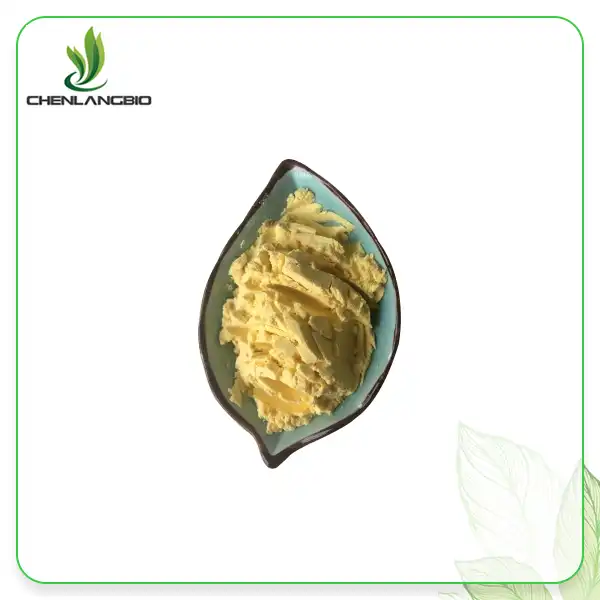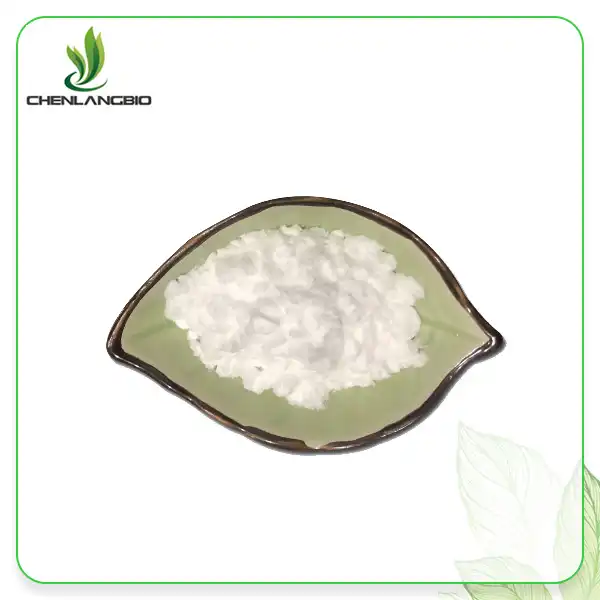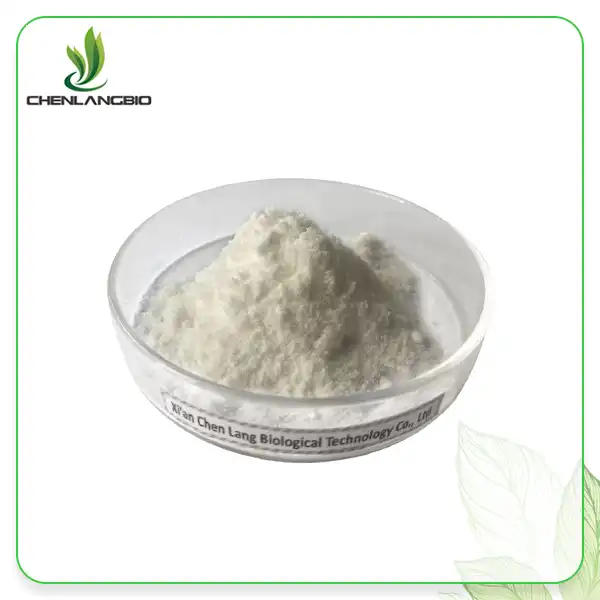Lupinus Albus Extract: Health Benefits and Uses
2024-11-11 16:38:06
Discover the incredible potential of lupinus albus extract, a powerful natural ingredient derived from white lupin seeds. This blog explores its numerous health benefits, nutritional value, and practical ways to incorporate it into your daily routine.
What is Lupinus Albus Extract?
Lupinus Albus Extract, also known as white lupin seed extract, is derived from the seeds of the Lupinus albus plant. This legume, native to the Mediterranean region, has been cultivated for centuries due to its nutritional properties and versatile applications. The extract is obtained through a careful process that preserves the beneficial compounds found in the seeds.
Rich in proteins, fiber, and various bioactive compounds, lupinus albus extract has gained attention in recent years for its potential health benefits. It contains a unique profile of amino acids, antioxidants, and phytochemicals that contribute to its therapeutic properties. The extract is commonly used in dietary supplements, skincare products, and as a functional food ingredient.
One of the key components of Lupinus Albus Extract is gamma-conglutin, a protein that has shown promising effects on blood glucose regulation. Additionally, the extract is a source of alkaloids, flavonoids, and phenolic compounds, which contribute to its antioxidant and anti-inflammatory properties.
Top Health Benefits of Lupinus Albus
Lupinus Albus Extract offers a wide range of potential health benefits, making it a valuable addition to a healthy lifestyle. Here are some of the top advantages associated with this remarkable plant extract:
Blood Sugar Management
One of the most notable benefits of Lupinus Albus Extract is its potential to support healthy blood sugar levels. Studies have shown that gamma-conglutin, a protein found in white lupin seeds, may help regulate glucose metabolism. This property makes it particularly interesting for individuals concerned about maintaining stable blood sugar levels or those at risk of developing diabetes.
Heart Health Support
The cardiovascular benefits of Lupinus Albus Extract are multifaceted. Its high fiber content can help lower cholesterol levels, while its antioxidant properties may protect against oxidative stress and inflammation in the cardiovascular system. Some research suggests that regular consumption of lupin-based products may contribute to improved heart health and reduced risk of cardiovascular diseases.
Weight Management
Lupinus Albus Extract may be a valuable ally in weight management efforts. The high protein and fiber content of white lupin seeds can promote feelings of fullness and satiety, potentially reducing overall calorie intake. Additionally, some studies have indicated that lupin proteins may have a positive effect on fat metabolism, further supporting weight management goals.
Digestive Health
The fiber-rich nature of lupinus albus extract can contribute to improved digestive health. Dietary fiber plays a crucial role in maintaining regular bowel movements, preventing constipation, and supporting a healthy gut microbiome. The prebiotic properties of lupin fiber may also promote the growth of beneficial gut bacteria, further enhancing digestive wellness.
Skin Health and Anti-Aging
In addition to its internal health benefits, Lupinus Albus Extract has gained popularity in the skincare industry. Its antioxidant properties may help protect the skin from free radical damage and oxidative stress, which are major contributors to premature aging. Some studies suggest that topical application of lupin extract may improve skin elasticity, hydration, and overall appearance.
Bone Health
Lupinus Albus Extract is a good source of minerals essential for bone health, including calcium, magnesium, and phosphorus. Regular consumption of lupin-based products may contribute to maintaining strong bones and reducing the risk of osteoporosis, particularly in older adults.
How to Incorporate Lupinus Albus into Your Diet?
Integrating Lupinus Albus Extract into your daily routine can be both easy and delicious. Here are some practical ways to enjoy the benefits of this nutritious ingredient:
Dietary Supplements
One of the most straightforward ways to incorporate lupinus albus extract into your diet is through dietary supplements. These are available in various forms, including capsules, tablets, and powders. When choosing a supplement, opt for high-quality products from reputable manufacturers to ensure purity and potency.
Lupin Flour
Lupin flour, made from ground white lupin seeds, is a versatile ingredient that can be used in baking and cooking. It's gluten-free and high in protein, making it an excellent alternative for those with gluten sensitivities or those looking to increase their protein intake. Try substituting a portion of regular flour with lupin flour in your favorite recipes for added nutritional benefits.
Lupin Flakes
Lupin flakes are a convenient way to add a protein and fiber boost to your meals. They can be sprinkled over salads, mixed into yogurt or smoothies, or used as a topping for oatmeal and other breakfast cereals. Their mild, nutty flavor complements a wide range of dishes.
Protein Shakes and Smoothies
For those who enjoy protein shakes or smoothies, Lupinus Albus protein powder can be a great addition to your blends. It's an excellent plant-based protein source that can help support muscle recovery and overall nutrition. Combine it with your favorite fruits, vegetables, and plant-based milk for a nutritious and delicious drink.
Snack Foods
Innovative food manufacturers are incorporating Lupinus Albus into various snack foods, including crackers, chips, and energy bars. These products offer a convenient way to enjoy the benefits of white lupin while satisfying your snack cravings.
Cooking with Whole Lupin Seeds
While less common, whole lupin seeds can be used in cooking after proper preparation. They can be boiled, roasted, or ground into a paste for use in various dishes. However, it's essential to follow proper preparation methods to remove any bitter compounds and ensure digestibility.
As with any new dietary addition, it's advisable to start with small amounts and gradually increase your intake of Lupinus Albus products. This allows your digestive system to adjust and helps you monitor any potential sensitivities or allergic reactions.
Incorporating Lupinus Albus Extract into your diet can be an exciting way to enhance your nutritional intake and explore new flavors and textures in your meals. Whether you choose supplements, flour, or whole food products, this versatile ingredient offers numerous opportunities to support your health and wellness goals.
Conclusion
In conclusion, lupinus albus extract stands out as a promising natural ingredient with a wide array of potential health benefits. From supporting blood sugar management and heart health to promoting digestive wellness and skin health, this extract offers a holistic approach to enhancing overall well-being. By incorporating Lupinus Albus into your diet through various forms, you can harness its nutritional power and contribute to a healthier lifestyle.
As research continues to unveil the full potential of Lupinus Albus Extract, it's clear that this ancient legume has a bright future in modern nutrition and health. Whether you're looking to manage your weight, improve your heart health, or simply add more plant-based protein to your diet, Lupinus Albus Extract offers a natural and effective solution. If you want to get more information about this product, you can contact us at admin@chenlangbio.com.
References
1. Johnson, S. K., et al. (2017). Lupin: An emerging health food ingredient. Journal of Food Science and Technology, 54(5), 1165-1173.
2. Arnoldi, A., et al. (2015). The role of grain legumes in the prevention of hypercholesterolemia and hypertension. Critical Reviews in Plant Sciences, 34(1-3), 144-168.
3. Bertoglio, J. C., et al. (2011). Hypoglycemic effect of lupin seed γ-conglutin in experimental animals and healthy human subjects. Fitoterapia, 82(7), 933-938.
4. Duranti, M., et al. (2008). The α- and β-subunits of the seed globulins of Lupinus albus. Phytochemistry, 69(9), 1993-2001.
5. Sipsas, S. (2008). Lupin products—concepts and reality. Lupins for Health and Wealth, 506-513.
6. Lucas, M. M., et al. (2015). The future of lupin as a protein crop in Europe. Frontiers in Plant Science, 6, 705.
Send Inquiry
Related Industry Knowledge
- Benefits of Kola Nut Extract Powder for Energy
- Can Powdered L-Carnosine Be Mixed into Body Lotion
- What is Sodium Ascorbyl Phosphate Used For
- Does Honokiol Help With Sleep
- Is Ecdysterone And Turkesterone Superior To Hyaluronic Acid Powder?
- How Do I Use Ectoin Powder In Skincare Routines?
- What are the Side Effects of Green Coffee Bean Extract Powder
- Elastin Peptide for Skin
- Phenylethyl Resorcinol vs Hydroquinone
- What are the Benefits of Luteolin










